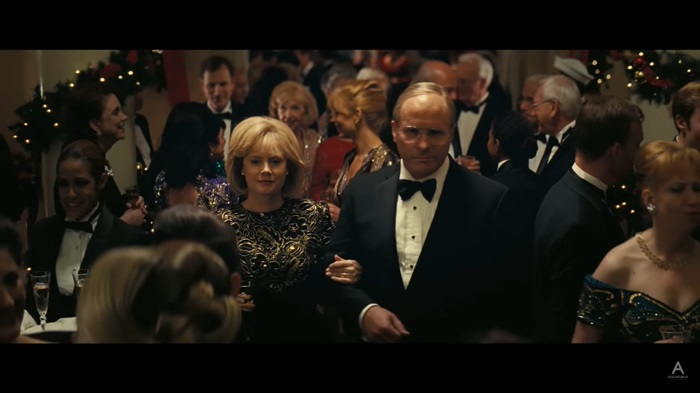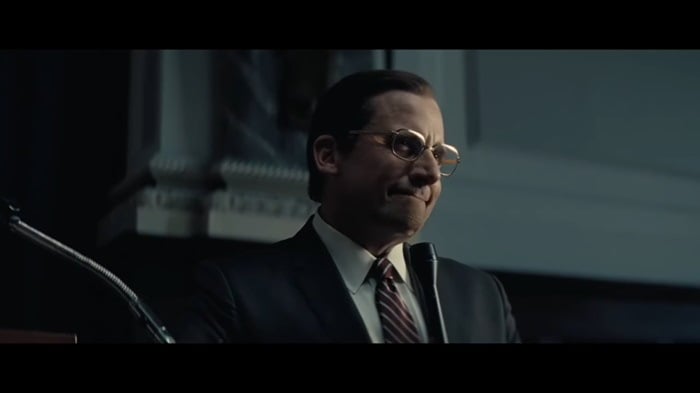Vice, directed by Adam McKay, is a satirical biographical film that delves into the life and political career of Dick Cheney, the 46th Vice President of the United States under President George W. Bush. The film uses a unique narrative style, blending dark humor and political commentary to explore Cheney's rise to power, his influence on the Bush administration, and the consequences of his actions. The ending of Vice is a fitting and thought-provoking conclusion to a film that unflinchingly examines the complexities of American politics and the impact of one man on the nation.
The Climax
The climax of Vice occurs as Dick Cheney (played by Christian Bale) becomes Vice President. This pivotal moment in the film is portrayed as the culmination of Cheney's decades-long quest for power and influence. The scene depicts the presidential inauguration of George W. Bush (played by Sam Rockwell) in January 2001. As Bush takes the oath of office, the camera cuts to Cheney, who stands to the side, a quiet and sinister figure observing his success.
Cheney's rise to the vice presidency is framed as a triumph of his cunning and ambition. He manipulates and influences Bush, leveraging the relative inexperience of the president-elect to consolidate his own power within the administration. This scene sets the stage for the concluding acts of the film, where the audience witnesses the consequences of Cheney's unchecked authority.
The Conclusion
The ending of Vice is not a traditional narrative resolution but rather a thought-provoking and unconventional sequence that serves as a vehicle for political commentary. As the film progresses towards its conclusion, it becomes increasingly apparent that Cheney's actions have had far-reaching and often devastating consequences for the country. The movie uses several narrative techniques and creative choices to drive this point home:
The Restaurant Scene: The film's concluding scene is set in an elegant restaurant. This setting is symbolic and allegorical, representing a space where the powerful and influential gather to discuss and make decisions that impact the nation. Cheney, his wife Lynne (played by Amy Adams), and various other characters from Cheney's life, such as George W. Bush, Donald Rumsfeld (played by Steve Carell), and Condoleezza Rice (played by LisaGay Hamilton), are present.
Philosophical Debate: The restaurant scene is not a typical dinner conversation. Instead, it evolves into a philosophical debate about the nature of power, politics, and the consequences of their actions. The characters engage in an intellectual discourse, and their dialogue carries significant weight.
Breaking the Fourth Wall: Throughout the film, there are moments when the characters break the fourth wall, addressing the audience directly. This technique adds an extra layer of engagement and commentary, making viewers feel like they are part of the discussion.
Cheney's Monologue: Dick Cheney, played brilliantly by Christian Bale, delivers a monologue that is a standout moment of the ending. In this speech, he embraces his role as a shadowy, enigmatic figure who wields immense power without public scrutiny. He asserts that power, when used effectively, can be its own justification. Cheney's monologue is chilling and captivating, revealing the character's unapologetic and unrepentant nature.
The Ambiguity of the Ending
The ending of Vice leaves the audience with a sense of ambiguity and contemplation. It doesn't provide a clear-cut resolution or moral judgment on the characters and their actions. Instead, it invites viewers to reflect on the intricate web of power, influence, and consequences in American politics. The film underscores the complexity of Cheney's legacy and the lasting impact he had on the nation.
The Philosophical Debate
The heart of the ending scene in Vice is the philosophical debate among the characters. As they converse in the restaurant, they grapple with fundamental questions about the nature of power and the moral implications of their actions. This debate serves as a metaphorical reckoning for Dick Cheney and his associates.
Cheney's Justification of Power: In his monologue, Dick Cheney defends his actions, arguing that power, when wielded effectively, can achieve its own ends. He suggests that power is a self-justifying force, and those who hold it are responsible for making the tough decisions that shape the nation, regardless of the consequences.

Lynne Cheney's Ambition: Lynne Cheney, portrayed by Amy Adams, is shown as a driving force behind her husband's ascent. She unabashedly expresses her desire for power and influence and believes that her husband's rise to the vice presidency is a triumph of their shared ambition.
Bush's Naiveté: George W. Bush, depicted by Sam Rockwell, is portrayed as somewhat naive and easily manipulated by Cheney. The film implies that his presidency was significantly influenced by Cheney's behind-the-scenes maneuvering, emphasizing the idea that those in power are not always who they seem to be.

Rumsfeld's Amorality: Donald Rumsfeld, portrayed by Steve Carell, is depicted as a pragmatist who is unconcerned with morality. He emphasizes the brutal reality of politics and power, where sometimes harsh decisions must be made for the greater good, even if it means ignoring ethics.
Condoleezza Rice's Perspective: Condoleezza Rice, played by LisaGay Hamilton, offers a counterpoint to the others. She represents a more principled approach to politics, suggesting that there is a moral cost to the decisions they make.
This philosophical debate is a powerful commentary on the moral grey areas that exist in politics. Vice challenges the audience to grapple with these complex questions and decide for themselves where they stand on the use and abuse of power.
Breaking the Fourth Wall
Throughout Vice the film employs the technique of breaking the fourth wall. This means that characters address the audience directly, acknowledging their presence and inviting them into the narrative. This technique is not only a stylistic choice but also a way to engage the audience in the political discourse presented in the film.
Audience as Witnesses: By breaking the fourth wall, the film makes the audience complicit in the events and decisions portrayed on screen. The audience becomes a silent witness to the characters' actions and is forced to confront the moral and ethical questions raised in the film.
Audience as Participants: When the characters speak directly to the audience, it creates a sense of participation. Viewers are made to feel as if they are part of the discussion, as if their judgment and perspective matter. This encourages a more active engagement with the film's themes.
Cheney's Monologue: In his monologue at the end, Cheney acknowledges the audience's presence, almost as if he is addressing the nation. He suggests that the American people bear some responsibility for the consequences of his actions, implying that the decisions made in the corridors of power affect everyone.
Breaking the fourth wall blurs the line between fiction and reality, underlining the film's intention to provoke thought and discussion






